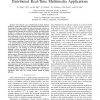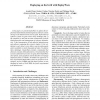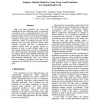105
Voted
CCGRID
2008
IEEE
15 years 9 months ago
2008
IEEE
We propose, implement and evaluate three admission models for computational Grids. The models take the expected demand into account and offer a specific performance guarantee. Th...
112
Voted
CCGRID
2008
IEEE
15 years 9 months ago
2008
IEEE
—As parallel file systems span larger and larger numbers of nodes in order to provide the performance and scalability necessary for modern cluster applications, the need for fau...
120
click to vote
CCGRID
2008
IEEE
15 years 9 months ago
2008
IEEE
Advance reservation allows users to request available nodes in the future, whereas economy provides an incentive for resource owners to be part of the Grid, and encourages users t...
131
Voted
CCGRID
2008
IEEE
15 years 9 months ago
2008
IEEE
—The research area of Multimedia Content Analysis (MMCA) considers all aspects of the automated extraction of new knowledge from large multimedia data streams and archives. In re...
96
Voted
CCGRID
2008
IEEE
15 years 9 months ago
2008
IEEE
Peer-to-peer overlays envision a single overlay substrate that can be used (possibly simultaneously) by many applications, but current overlays either target fast, few-hop lookups...
119
Voted
CCGRID
2008
IEEE
15 years 9 months ago
2008
IEEE
In this paper, we present DeployWare to address the deployment of distributed and heterogeneous software systems on large scale infrastructures such as grids. Deployment of softwa...
108
Voted
CCGRID
2008
IEEE
15 years 9 months ago
2008
IEEE
Hidden information is a critical issue for the successful delivery of SLAs in grid systems. It arises when the agents (hardware and software resources) employed to serve a task be...
93
Voted
CCGRID
2008
IEEE
15 years 9 months ago
2008
IEEE
Replication is a key technique for improving fault tolerance. Replication can also improve application performance under some circumstances, but can have the opposite effect under...
125
Voted
CCGRID
2008
IEEE
15 years 9 months ago
2008
IEEE
Collective operations and non-blocking point-to-point operations are two important parts of MPI that each provide important performance and programmability benefits. Although non...
127
Voted
CCGRID
2008
IEEE
15 years 9 months ago
2008
IEEE
Long term load prediction can assist task scheduling and load balancing greatly in distributed environment such as computational grid. Due to the dynamic property of grid environm...




